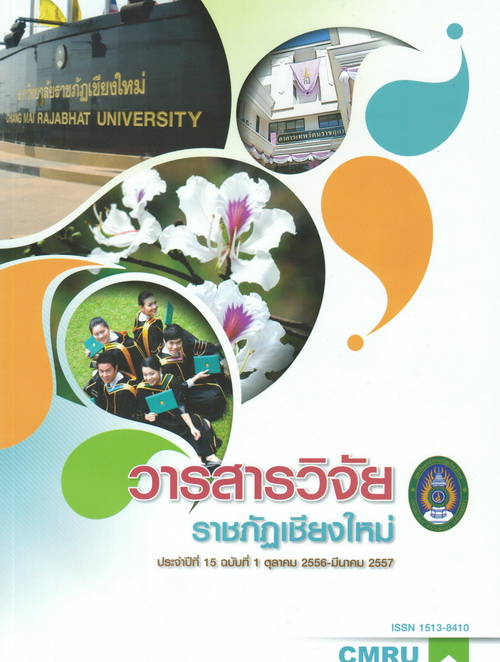การพัฒนารูปแบบการบริการสนับสนุนนักศึกษาพิการที่เรียนร่วม ในสถาบันอุดมศึกษา: การศึกษาบทบาทของหนวยงานที่สนับสนุนการจัดการศึกษาสำหรับนักศึกษาพิการที่เรียนร่วมในมหาวิทยาลัยราชกัฏเชียงใหม่
DOI:
https://doi.org/10.14456/rcmrj.2014.96163คำสำคัญ:
การพัฒนา, รูปแบบการบริการสนับสนุน, นักศึกษาพิการที่เรียนร่วม, สถาบันอุดมศึกษา, หน่วยงานสนับสนุน, Development, Supporting Services Model, student with Special Needs, Higher Education Institute, Supporting Organizationsบทคัดย่อ
การวิจัยครั้งนี้มีวัตถุประสงค์ เพื่อพัฒนารูปแบบการบริการสนับสนุนของหน่วยงานที่สนับสนุนการจัดการศึกษาสำหรับนักศึกษาพิการที่เรียนร่วมในมหาวิทยาลัยราชภัฏเชียงใหม่ กลุ่มตัวอย่าง ประกอบด้วย นักศึกษาพิการ จำนวน 6 คน อาจารย์ผู้สอนนักศึกษาพิการ จำนวน 3 คน ผู้บริหารหน่วยงานบริการสนับสนุนนักศึกษาพิการ จำนวน 4 คน และผู้บริหารมหาวิทยาลัยจำนวน 2 คน รวมทั้งสิ้น 16 คน ประเภทการวิจัยเป็นการวิจัยเชิงงปฏิบัติการ (Action research) การดำเนินการวิจัยแบ่งการวิจัยออกเป็น 4 ระยะดังนี้ ระยะที่ 1 ขั้นเตรียมการ (Preparing Phase) ระยะที่ 2 ขั้นสำรวจ (Survey Phase) ระยะที่ 3 ขั้นวิเคราะห์และลังเคราะห์ (Analysis and Synthesis Phase) และระยะที่ 4 ขั้นการประเมินผล (Evaluation Phase)
ผลการวิจัย พบว่า ได้รูปแบบการบริการสนับสนุนของหน่วยงานที่สนับสนุนการจัดการศึกษาสำหรับนักศึกษาพิการที่เรียนร่วม คือ PACoS Model ที่ประกอบด้วย P: Policy-นโยบายในการจัดการศึกษาสำหรับนักศึกษาพิการ A: Awareness-การสร้างความตระหนักด้านทัศนคติ และสิทธิขั้นพื้นฐานทางการศึกษาสำหรับนักศึกษาพิการ Co: Co-operation-การประสานความร่วมมือของหน่วยงานที่เกี่ยวข้อง ร: Support-การให้การสนับสนุนการจัดการศึกษาสำหรับนักศึกษาพิการซึ่ง PACoS Model เป็นรูปแบบที่ได้จากผลการวิเคราะห์ข้อมูลจากการเก็บรวบรวมจากกลุ่มตัวอย่าง นอกจากนี้ยังเป็นไปตามหลักการจัดการเรียนร่วม ได้แก่ สภาวะปกติ (Normalization) สภาพแวดล้อมที่มืความจำกัดน้อยที่สรูด (The Least RestrictiveEnvironment: LRE) แนวคิดการจัดการศึกษาเพื่อปวงชน (Education for All) และทฤษฎีของ Ecological Framework ของ Bronfenbrenner
THE DEVELOPMENT OF SUPPORTING SERVICES MODEL FOR STUDENT WITH SPECIAL NEEDS IN HIGHER EDUCATION A STUDY OF MISSION OF SUPPORTING ORGANIZATIONS IN SUPPORTING SERVICES FOR STUDENT WITH SPECIAL NEEDS IN CHIANG MAI RAJABHAT UNIVERSITY
This research aimed to develop a model to support the organization where support to education for students with disabilities who studying in Chiang Mai Rajabhat University. The samples consisted of 16 people who are personnel-related support services, education for students with disability. They were students with disabilitiy, teachers who teach students with disabilities, the representative of support services organization for students with disabilities, and university administrators. Type of research is Action research. The Process of research divided into four stages as follows: Phase 1 the Preparing Phase, Phase 2 the Survey Phase, Phase 3 the Analysis and Synthesis Phase and Phase 4 Evaluation Phase.
The results was PACoS Model which are P: Policy-policy as defined in education for students with disabilities, A: Awareness-awareness raising a positive attitude. Fundamental right to education for students with disabilities, Co: Co-operation-collaboration. Cooperation of the organization involved in supporting the education of students with disabilities, and ร: Support-support to support the education for students with disabilities who are studying in Chiang Mai Rajabhat University. The reason is that this model is come from a theory of data analysis and the results obtained from the study of support services organizations, teachers who teach students with disabilities, and the needs of students with disabilities. It is also based on the principle of Normalization, The Least Restrictive Environment: LRE, the concept of EFA (Education for All), and the theory Ecological Framework of Bronfenbrenner.
Downloads
ดาวน์โหลด
รูปแบบการอ้างอิง
ฉบับ
ประเภทบทความ
สัญญาอนุญาต
1. บทความ ข้อมูล เนื้อหา รูปภาพ ฯลฯ ที่ได้รับการตีพิมพ์ใน “Community and Social Development Journal” ถือเป็นลิขสิทธิ์ของ Community and Social Development Journal มหาวิทยาลัยราชภัฏเชียงใหม่ และเพื่อให้เผยแพร่บทความได้อย่างเหมาะสมผ่านสื่อสิ่งพิมพ์และอิเล็กทรอนิกส์ ผู้เขียนยังคงถือครองลิขสิทธิ์บทความที่ตีพิมพ์ภายใต้ใบอนุญาต Creative Commons Attribution (CC BY) ซึ่งอนุญาตให้เผยแพร่บทความซ้ำในแหล่งอื่นได้ โดยอ้างอิงต้องอ้งอิงบทความในวารสาร ผู้เขียนต้องรับผิดชอบในการขออนุญาตผลิตซ้ำเนื้อหาที่มีลิขสิทธิ์จากแหล่งอื่น
2. เนื้อหาบทความที่ปรากฏในวารสารเป็นความรับผิดชอบของผู้เขียนบทความโดยตรง ซึ่งกองบรรณาธิการวารสารไม่จำเป็นต้องเห็นด้วยหรือร่วมรับผิดชอบใดๆ














